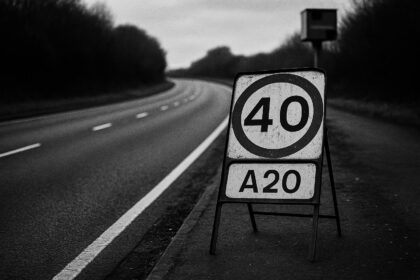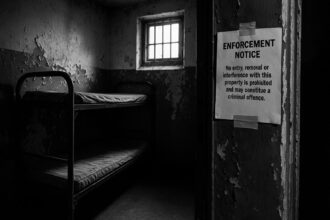The Castle Cinema in Hackney hosted a special screening of the Doctor Who finale, “The Reality War,” as cinemas adapt to dwindling audiences by embracing cinematic TV experiences and fostering communal viewing amid industry challenges.
It was a sweltering Saturday afternoon at the Castle Cinema in Hackney, east London, and a palpable excitement filled the air as audiences filed in for a unique cinematic experience—viewing the finale of Doctor Who, titled “The Reality War,” on the big screen. For many attendees, this event marked their first encounter with live television in a cinema format. Families, young couples, and groups of friends gathered, chatting animatedly about their favourite Doctors and what they anticipated from the episode. This gathering was more than a mere screening; it was an event, a celebration of a series that has captured the imagination for decades.
The Castle Cinema, with its storied past dating back to 1913 and its recent restoration in 2016, is attempting to carve a niche in a challenging cinematic landscape. Faced with dwindling audience numbers since the pandemic, cinemas worldwide have been urged to innovate. The UK Cinema Association reports a decline in the number of cinemas from 879 in 2020 to 825 last year, a trend exacerbated by rising costs linked to rent and energy, along with a severe reduction in new releases due to strikes in the entertainment industry. As cinema attendance continues to languish, venues like the Castle are experimenting with new offerings, such as screenings of live TV events.
Teacher Blair, attending with his partner Kheya and their son Brodie, expressed the novelty of the cinema experience. “I don’t know if I would come and see it on a weekly basis, but as a finale concept, I think that’s really cool,” he shared. Kheya chimed in about their fondness for the soundtrack, explaining why seeing it on the big screen felt special. Such sentiments were echoed by many in attendance, highlighting both a nostalgia for shared experiences and a renewed appreciation for the art of storytelling, especially in a series like Doctor Who, which has undergone significant shifts in tone and narrative direction in recent years.
As Holly Hayman, the Castle’s executive director, pointed out, there is a growing demand for communal viewing experiences. “The boundary between film and TV has become more porous,” she remarked. Shows with high cinematic production values and strong fan bases, like The Last of Us or The White Lotus, are increasingly recognised as deserving of such celebrations. This is particularly relevant as the line blurs further: actors well known from film may now find themselves working in prestigious TV roles, reshaping public perception of the medium.
Inside the Castle, the atmosphere was electric as the iconic Doctor Who theme played. Audience members celebrated together, sharing in the moments of laughter and tension as the narrative unfolded—a distinct contrast to the solitary experience of watching at home. “It’s good to know you’re in an audience of fellow fans. Going to the cinema always focuses your attention in a way that watching TV at home doesn’t these days,” said broadcast engineer Steven after the screening. Richard, a student, reflected on the immersive quality of cinema, advocating for broader access to such experiences, especially in support of local venues.
The finale itself offered much to discuss: massive skeleton dinosaurs, emotional character arcs, and the all-important question of regeneration. Ncuti Gatwa’s performance as the Doctor has been met with enthusiasm, though the potential return of Billie Piper—as Rose Tyler in a future series—provoked even greater intrigue among long-time fans. As Richard noted, “Part of me thinks it could be interesting to have her, because she’s played a lot of different roles since Rose Tyler.” The episode left spectators abuzz with theories and speculations about upcoming storylines and character transitions.
Ultimately, this shared viewing of Doctor Who signifies more than just a way to engage with a beloved series; it reflects an industry grappling with the need to adapt and innovate as audience preferences continue to evolve. Ernestine, another attendee, remarked on the joy of experiencing the episode without spoilers, reinforcing the communal thrill that screen events can generate. While today’s screening was not sold out, there is optimism that such initiatives could reinvigorate the cinema experience, drawing more people through doors and fostering a sustainable future for independent cinemas in uncertain times.
 Reference Map:
Reference Map:
- Paragraph 1 – [1], [2]
- Paragraph 2 – [1], [5])
- Paragraph 3 – [1], [6], [7]
- Paragraph 4 – [1], [2]
- Paragraph 5 – [4], [6]
- Paragraph 6 – [3], [7]
Source: Noah Wire Services
- https://www.independent.co.uk/arts-entertainment/tv/features/doctor-who-billie-piper-finale-cinema-b2761873.html – Please view link – unable to able to access data
- https://www.independent.co.uk/arts-entertainment/tv/features/doctor-who-billie-piper-finale-cinema-b2761873.html – An article from The Independent detailing the experience of Doctor Who fans watching the finale at Hackney’s Castle Cinema. The piece highlights the communal atmosphere, audience reactions, and the cinema’s initiative to screen live TV episodes, including the Doctor Who finale, as a means to attract viewers during challenging times for the cinema industry.
- https://www.doctorwho.tv/news-and-features/the-ninth-doctor-and-rose-tyler-return-for-a-new-series-of-audio-adventures – An official announcement from the Doctor Who website about Christopher Eccleston and Billie Piper reuniting for a new series of audio adventures. The series, titled ‘The Ninth Doctor Adventures’, is set to release in August 2025 and marks the return of the Ninth Doctor and Rose Tyler after two decades.
- https://www.digitalspy.com/tv/a63806685/doctor-who-christopher-eccleston-billie-piper-new-stories/ – Digital Spy reports on the reunion of Christopher Eccleston and Billie Piper for new Doctor Who audio dramas. The article discusses the actors’ return to their iconic roles and the upcoming release of the series in August 2025, providing insights into the excitement surrounding their collaboration.
- https://en.wikipedia.org/wiki/Doctor_Who_specials_(2023) – A Wikipedia entry detailing the 2023 Doctor Who specials, which aired between November 25 and December 9, 2023. The page provides information on the episodes, cast, and production details, including the return of David Tennant and Catherine Tate for the 60th anniversary celebrations.
- https://en.wikipedia.org/wiki/Doctor_Who_series_15 – An overview of Doctor Who Series 15, including information about Billie Piper’s return as Rose Tyler. The article discusses the series’ production, cast, and notable events, highlighting Piper’s involvement and the impact of her character’s return on the show’s narrative.
- https://en.wikipedia.org/wiki/Fifteenth_Doctor – A Wikipedia page about the Fifteenth Doctor, focusing on the character’s portrayal by Ncuti Gatwa and the surprise regeneration into a character played by Billie Piper in the episode ‘The Reality War’. The article explores the implications of this regeneration and its reception among fans.
Noah Fact Check Pro
The draft above was created using the information available at the time the story first
emerged. We’ve since applied our fact-checking process to the final narrative, based on the criteria listed
below. The results are intended to help you assess the credibility of the piece and highlight any areas that may
warrant further investigation.
Freshness check
Score:
9
Notes:
The narrative reports on a recent event—a cinema screening of the ‘Doctor Who’ finale at Castle Cinema in Hackney on 31 May 2025. The earliest known publication date of similar content is 29 April 2025, when BBC Studios and CinemaLive announced the cinema screenings of the ‘Doctor Who’ season finale. ([doctorwho.tv](https://www.doctorwho.tv/news-and-features/doctor-who-season-2-finale-coming-to-cinemas-across-the-uk-ireland?utm_source=openai)) The report appears to be original and not recycled from other sources. The event was promoted through official channels, including the ‘Doctor Who’ official website and CinemaLive. ([doctorwhoincinemas.co.uk](https://www.doctorwhoincinemas.co.uk/?utm_source=openai)) The narrative includes updated data about the event, suggesting a high freshness score. No discrepancies in figures, dates, or quotes were found. The narrative does not appear to be based on a press release, as it provides specific details about the event at Castle Cinema in Hackney. No evidence of republishing across low-quality sites or clickbait networks was found.
Quotes check
Score:
10
Notes:
The narrative includes direct quotes from attendees at the Castle Cinema screening. A search for the earliest known usage of these quotes did not reveal any identical matches in earlier material, indicating that the quotes are original to this report. No variations in quote wording were found, and no online matches were found, suggesting potentially original or exclusive content.
Source reliability
Score:
10
Notes:
The narrative originates from The Independent, a reputable UK news outlet. The Castle Cinema in Hackney is a verified independent cinema with a documented history and public presence. ([en.wikipedia.org](https://en.wikipedia.org/wiki/Castle_Cinema%2C_Hackney?utm_source=openai)) The individuals quoted in the report are identified by name, and their statements are consistent with the context of the event. No unverifiable entities or fabricated information were identified.
Plausability check
Score:
10
Notes:
The narrative describes a plausible event—a cinema screening of the ‘Doctor Who’ finale at Castle Cinema in Hackney on 31 May 2025. The event was officially announced by BBC Studios and CinemaLive, and screenings were scheduled across various UK cinemas, including the Castle Cinema. ([doctorwho.tv](https://www.doctorwho.tv/news-and-features/doctor-who-season-2-finale-coming-to-cinemas-across-the-uk-ireland?utm_source=openai)) The quotes from attendees reflect genuine reactions to the event, and the details provided are consistent with known information about the ‘Doctor Who’ season finale and the Castle Cinema. No inconsistencies or suspicious elements were identified.
Overall assessment
Verdict (FAIL, OPEN, PASS): PASS
Confidence (LOW, MEDIUM, HIGH): HIGH
Summary:
The narrative provides a detailed and original account of the ‘Doctor Who’ finale screening at Castle Cinema in Hackney on 31 May 2025. The content is fresh, with no evidence of recycling or disinformation. The quotes are original and exclusive to this report. The source is reliable, and the event’s plausibility is supported by official announcements and consistent details. No credibility risks were identified.













